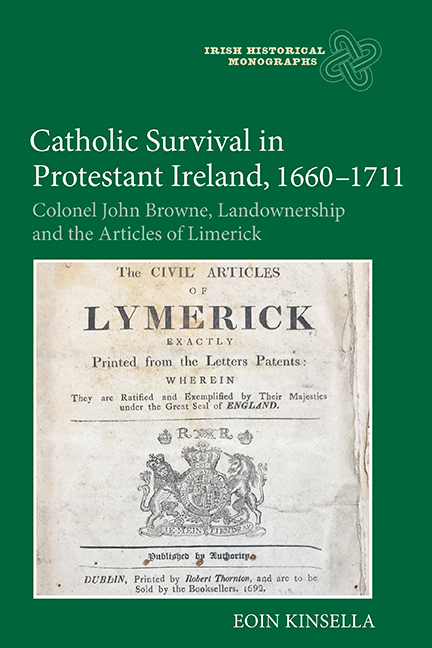 Catholic Survival in Protestant Ireland, 1660–1711
Catholic Survival in Protestant Ireland, 1660–1711 from Part II - The Articles of Surrender
Published online by Cambridge University Press: 28 June 2018
The articles of Galway and Limerick were considerably more complex than the surrenders previously negotiated and, owing to the number of Catholics expected to claim their benefit, were much more important to the Williamite settlement in Ireland. As a consequence both sets of articles – particularly the articles of Limerick – were subjected to intense scrutiny by the Irish and English administrations. Moreover, the greater number of claimants to the articles of Limerick allowed the articlemen to fund and direct a lobbying effort more concentrated in nature than that of the minor articlemen. Throughout the 1690s, the interpretation and implementation of the articles of Galway and Limerick provoked controversy. This chapter examines the articles of Limerick, with a particular focus on their early interpretation by the Irish and English governments. The articles of Limerick were viewed with deep suspicion and hostility by Irish Protestants, who feared a repeat of the Catholic resurgence of the 1680s. The Irish government came under intense pressure, both from the articlemen and the Protestant polity, to interpret the articles in different ways. Protestants argued for as narrow an interpretation as possible, while the articlemen naturally pressed the opposite case.
Section II identifies the leading Catholic lobbyists in London and analyses the inconsistent attitude adopted by the Irish government to the implementation of the articles. The king's official attitude to the articles of surrender during the 1690s was that they should be interpreted with ‘justice but not favour’. Justice was, however, a fluid concept and the Irish and English administrations sought ways to exploit the weaknesses of the articles. The potential for instability in Ireland was enormous, and the Williamite authorities were mindful that to revoke the articles entirely was potentially catastrophic. They were required to tread a fine line between pandering to Protestant hostility to the articles, and appearing overly sympathetic to the recently defeated Jacobite rebels. Section III addresses attempts in 1692 to give legislative protection to the articles of Limerick through a proposed bill of indemnity, while Section IV provides an overview of continued hostility to the articles among Protestant politicians, up to the passing of the act confirming an abridged version of the articles of Limerick in 1697 and the opening of the third and final court of claims.
To save this book to your Kindle, first ensure no-reply@cambridge.org is added to your Approved Personal Document E-mail List under your Personal Document Settings on the Manage Your Content and Devices page of your Amazon account. Then enter the ‘name’ part of your Kindle email address below. Find out more about saving to your Kindle.
Note you can select to save to either the @free.kindle.com or @kindle.com variations. ‘@free.kindle.com’ emails are free but can only be saved to your device when it is connected to wi-fi. ‘@kindle.com’ emails can be delivered even when you are not connected to wi-fi, but note that service fees apply.
Find out more about the Kindle Personal Document Service.
To save content items to your account, please confirm that you agree to abide by our usage policies. If this is the first time you use this feature, you will be asked to authorise Cambridge Core to connect with your account. Find out more about saving content to Dropbox.
To save content items to your account, please confirm that you agree to abide by our usage policies. If this is the first time you use this feature, you will be asked to authorise Cambridge Core to connect with your account. Find out more about saving content to Google Drive.